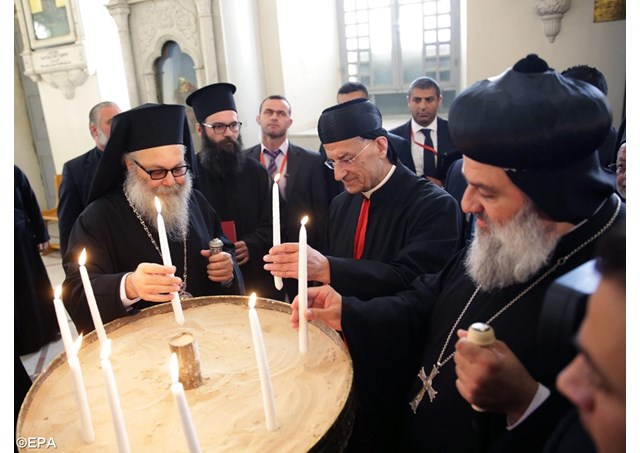
Pope Francis to receive Syrian Orthodox Patriarch

(Vatican Radio) From June 17-20, Moran Mor Ignatius Aphrem II, Syrian Orthodox Patriarch of Antioch and all the East, will be in Rome to meet with Pope Francis. Aphrem II was elected the 123rd Syrian Orthodox Patriarch of Antioch in 2014.
The Syrian Orthodox Church traces its history to the first Christian communities established in Antioch. Both St Peter and St Paul resided in Antioch. It was from Antioch that the first missionaries went forth to evangelize Asia and Europe. The Syrian Orthodox Church arose from divisions following the Council of Chalcedon in 451.
The Syrian Orthodox Church has a patriarchal structure. There are Syrian Orthodox communities in Syria, Turkey, Iraq, Lebanon, and Israel; and on account of various waves of emigration in the United States, Canada, the United Kingdom, Australia, and New Zealand. The largest community is in India. The Malankara Syrian Orthodox Church is an integral part of the Syrian Orthodox Church and recognizes the Syrian Orthodox Patriarch of Antioch as the supreme patriarch. The Catholicos for the Malankara Syrian Orthodox Church is His Beatitude Mor Baselios Thomas I, who will be part of the delegation visiting Rome.
This martyr Church has known episodes of persecution in its history of emigration, and even more recently, with the tragic events verified in Syria and Iraq. The Archbishop of the Syrian Orthodox Church of Aleppo, Mar Gregorius Yohanna Ibrahim, together with Bishop Paul Yazigi, of the Greek-Orthodox Church of Aleppo, were kidnapped two years ago, on 22 April 2013, in the peripheries of Aleppo. The Syrian Orthodox Church has already undergone a tragedy of Sayfo (Spada), when half a million Syrians were killed at the end of the First World War; which took place at the same time as the violence against the Armenians.
The Syrian Orthodox Church, among the eastern Orthodox Churches, is very close to the Catholic Church. The common declaration signed by Pope John Paul II and Patriarch Mar Zakka I Iwas in Rome (23 June 1984) recognized that the two parties profess the same faith in Christ and attributed the divergence in Christological terminology to cultural diversity. In November of 1993, the Joint Theological Commission of the Catholic Church and the Malankara Syrian Orthodox Church drew up an agreement on inter-religious marriage, known today as the “Kerala Contract.” This agreement was approved by Pope John Paul II and the Patriarch on 25 January 1994, and was accompanied by a series of pastoral directives.
The Patriarch will meet with Pope Francis on Friday, who share a moment of prayer together on Friday 19 June. He will also have a meeting at the Pontifical Council for the Promotion of Christian Unity, and will make a visit to the tomb of St Peter.
| All the contents on this site are copyrighted ©. |


